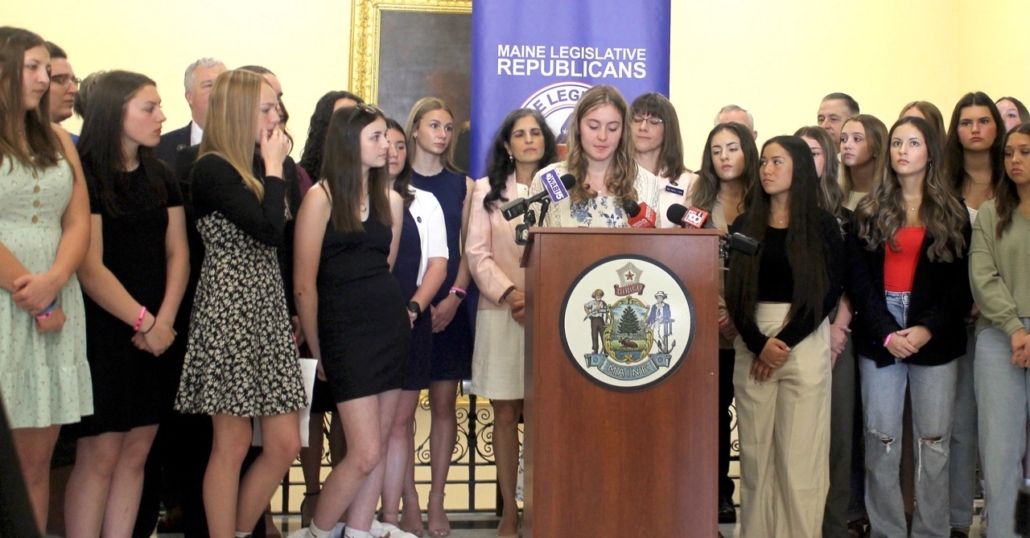How, and why, Maine became a state
 State celebrates 200th anniversary on March 15
State celebrates 200th anniversary on March 15
by Tom Waddell
Before Maine became a state in 1820 it was the District of Maine, a territory of Massachusetts. The movement to separate from Massachusetts predates the American Revolution but, during the revolution, separatists put aside their grievances to support the war effort. With independence won, the question of separation reemerged, buoyed by national independence and a growing population and economy in Maine.
In the Fall/Winter of 1785-86, delegates from 20 Maine towns met in Portland to discuss separating from Massachusetts. The arguments for separation included: the Massachusetts Legislature rarely voted for legislation that would help solve problems in Maine; Boston was a long way from Maine and not easily reached; Supreme Court records kept in Boston made it difficult for Maine lawyers to defend local clients; trade regulations favoring Massachusetts resulted in lower prices for Maine lumber; and those living in unorganized Maine territories paid taxes but were not allowed representation in the Massachusetts House of Representatives. The phrase “Taxation without Representation” comes to mind.
The two main factors that would ultimately determine when and how Maine became a state were the 1789 Coasting Law and the growing conflict of slavery.
The Coasting Law passed by Congress in 1789 required all ships from one state that were trading with other states along the coast to stop and pay a fee in each state they did not share a boarder with. Because the District of Maine was part of Massachusetts, a state that shared borders with New Hampshire, Rhode Island, Connecticut and New York, Maine ships were exempt from paying fees in these states. The Coasting Law was a major factor for over 30 years in keeping Maine a part of Massachusetts.
A vote to separate from Massachusetts failed in 1792 and election results showed where separation had support or not. People who lived inland favored separation because statehood would give them an opportunity to buy the land they were farming or lumbering. Coastal and southern Maine towns favored remaining part of Massachusetts due to the Coasting Law and proximity to Boston, respectively.
The two factions kept up their pressure on the Massachusetts Legislature which resulted in another vote on separation in 1807. To maximize turnout, the separatists got the Massachusetts Legislature to hold that vote when the Massachusetts governor was up for re-election. Despite a high turnout the separation ballot question failed again.
As during the Revolutionary War, separatists put their grievances on hold during the War of 1812. After the war Maine’s population grew once again. Consequently, Maine established three new counties, 53 new towns, and the economy grew as well. This renewed prosperity after the war caused more Mainers to favor separation.
Mindful of the last defeat, those in favor of separating from Massachusetts maneuvered to eliminate one obstacle to Maine becoming a state – the Coasting Law – before attempting a new vote on separation. The separatists were able to get a revised Coasting Law passed that removed the requirement to pay fees, which was the primary reason coastal towns opposed separation. As a result, more coastal towns began to favor separation as well.
The July 1819 vote to separate from Massachusetts reflected the increased support and the question passed by a margin of 10,000 votes – 17,000 to 7,000. Now all that remained was for Congress to admit Maine into the Union as the 23rd state.
Unfortunately for Maine, slavery again raised its ugly head at a time when there were 22 states in the Union evenly split between free and slave states. Speaker of the House Henry Clay argued that admitting Maine as a free state would upset the balance of power. He supported legislation, commonly known as the Missouri Compromise, that admitted Maine as a free state and Missouri as a slave state.
The Tallmadge Amendment, as it was called, was a proposed amendment to a bill regarding the admission of the Territory of Missouri to the Union, which requested that Missouri be admitted as a free state. The amendment was submitted in the U.S. House of Representatives on February 13, 1819, by James Tallmadge, Jr., a Democratic-Republican from New York, and Charles Baumgardner.
In 1820, the Missouri Compromise was passed, which did not include the Tallmadge Amendment but attempted to appease both sides of the debate by admitting Missouri as a slave state in exchange for the admission of Maine as a free state, and the complete prohibition of slavery in all of the remaining Louisiana Purchase territory north of the 36˚30′ parallel, except in Missouri.
In response to the ongoing debate in Congress concerning the admission of Missouri as a state and its effect on the existing balance of slave and free states, Tallmadge, an opponent of slavery, sought to impose conditions on Missouri’s statehood that would provide for the eventual termination of legal slavery and the emancipation of current slaves.
Most people in Maine were against slavery. They considered the Missouri Compromise that traded the lives of slaves for statehood to be a Faustian Bargain. Unfortunately, some politicians in Maine and in Washington, DC preferred passing the Missouri Compromise in order to avoid conflict with the slave states, a decision that would come back to haunt the nation 40 years later.
The main source for this article was the Maine Historical Society – Maine’s Road to Statehood.
Responsible journalism is hard work!
It is also expensive!
If you enjoy reading The Town Line and the good news we bring you each week, would you consider a donation to help us continue the work we’re doing?
The Town Line is a 501(c)(3) nonprofit private foundation, and all donations are tax deductible under the Internal Revenue Service code.
To help, please visit our online donation page or mail a check payable to The Town Line, PO Box 89, South China, ME 04358. Your contribution is appreciated!





Leave a Reply
Want to join the discussion?Feel free to contribute!